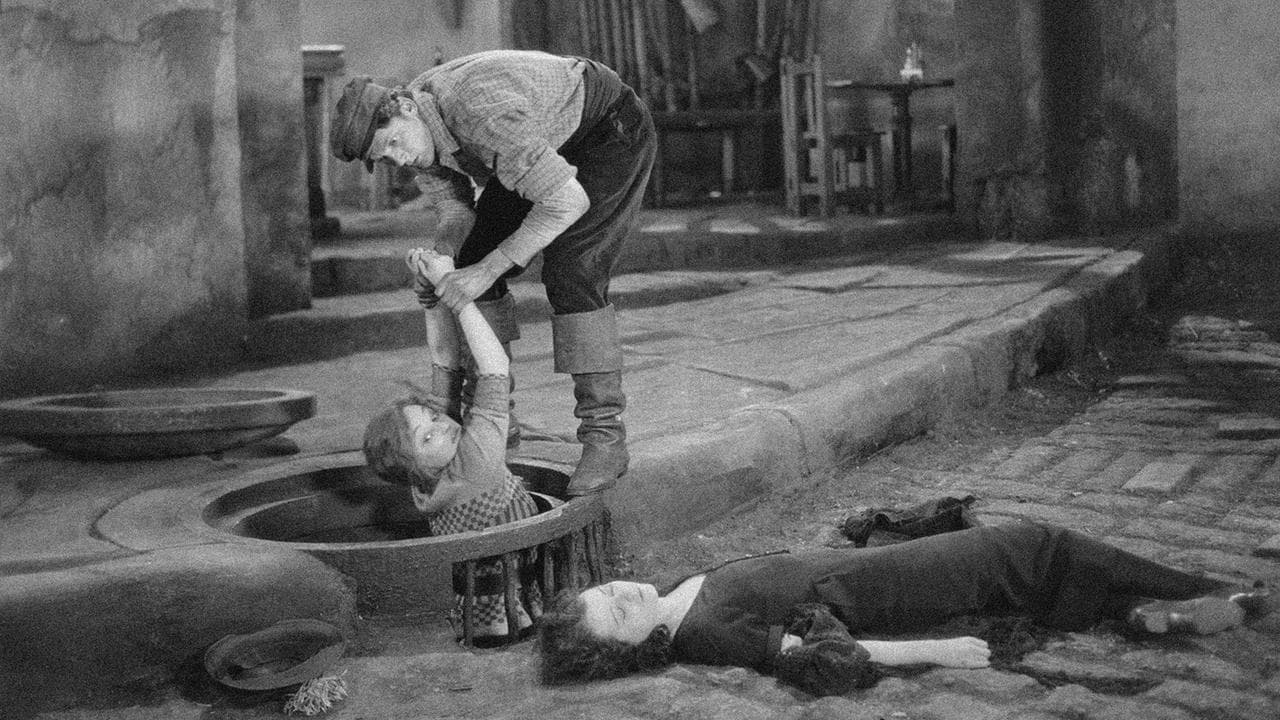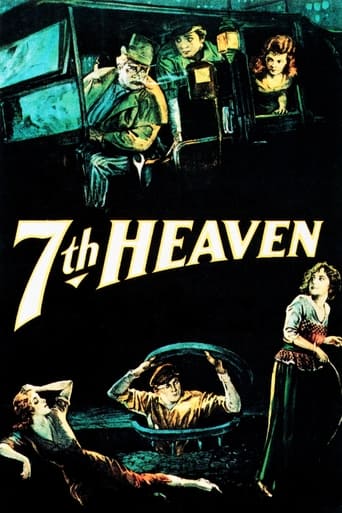Huievest
Instead, you get a movie that's enjoyable enough, but leaves you feeling like it could have been much, much more.
Kaydan Christian
A terrific literary drama and character piece that shows how the process of creating art can be seen differently by those doing it and those looking at it from the outside.
Deanna
There are moments in this movie where the great movie it could've been peek out... They're fleeting, here, but they're worth savoring, and they happen often enough to make it worth your while.
Zandra
The movie turns out to be a little better than the average. Starting from a romantic formula often seen in the cinema, it ends in the most predictable (and somewhat bland) way.
utgard14
In Paris, a sewer worker (Charles Farrell) aspiring for more rescues a meek young woman (Janet Gaynor) from her abusive sister. The two soon fall in love but war threatens their happiness. Beautiful romantic melodrama, a silent classic, artfully directed Frank Borzage with a lovely tune ("Diane") that plays throughout. Janet Gaynor is terrific. This was one of the three films she won the first Best Actress Oscar for, and it's easy to see why. Charles Farrell is also good. Certainly better than many give him credit for. Nice sets, camera-work, great performances. Really not much I can say about this one that's bad. It's one of my favorite silent movies. One that I think still holds up well today. Remade in 1937 with Jimmy Stewart and Simone Simon. That one's not as magical as this but it does have its merits.
evanston_dad
"Seventh Heaven," Frank Borzage's poetic romantic melodrama from 1927, was the last of the three films nominated for the first Best Picture Oscar that I have now finished viewing (the other two being Lewis Milestone's "The Racket" and William A. Wellman's "Wings"). It's a sweet little movie about a meek waif (Janet Gaynor) who meets cute with a macho street cleaner (Charles Farrell) and then proceeds to fall in love with him, and he with her, while living together as a fake husband and wife in order to fool the authorities and prevent Gaynor from going to jail (that's another story, and is disposed of within the film's first 20 minutes or so). From there, the film transitions into full-blown melodrama as Farrell goes off to war and Gaynor waits stoically for him to return.This all would be enough to make one gag, if someone other than Borzage had directed it. He had a knack for taking the most saccharine subject matter and handling it with utmost delicacy; as a result, you're utterly charmed and swept up in the film's romanticism even as your head tells you you should be rolling your eyes. It also helps that Farrell and especially Gaynor were very good actors, and they make the characters believable while keeping the rampant sentimentality at bay.Borzage won the first Best Director Oscar for his work, and Gaynor was Oscar's first Best Actress, winning for this and two other films, "Street Angel" and "Sunrise," back when Oscars were given for entire bodies of work over a year and not for one specific film. Writer Benjamin Glazer completed the film's triplicate wins by taking home the first Oscar for Writing (Adaptation), before a screenplay award even existed."Seventh Heaven" was passed over in the Best Picture category for "Wings," and it also lost Art Direction (for Harry Oliver's impressive Parisian loft and WWI battlefield sets), but with five nominations it emerged as the most nominated film in Oscar's debut year.Grade: A
MartinHafer
It's an interesting coincidence that I saw the 1930s remake of "Seventh Heaven" just a week or so prior, so I was able to compare them. While I hated the remake for so many reasons (the dumb casting of Jimmy Stewart as a Frenchman among them), I adored this silent version. There are three main reasons for this. First, the direction in the silent was fantastic as was the camera-work. I loved the scenes where you see the leads walking up the many flights of steps with the camera following them, but the movie also was so artfully conceived in so many other ways. It truly was a work of art. Second, this sort of old fashioned romance just seems to work better as a silent. Whereas you might be more willing to accept the old fashion style in a silent, in a talking picture the plot seemed much more forced. Third, the acting was just better--a lot better. Jimmy Stewart was just lost playing an Atheistic Frenchman--whereas Charles Farrell was much more believable and likable--plus his character was softer and more likable in the earlier film. Stewart, oddly, played a jerk. And while Simone Simon was well cast in the remake (as she is French), Janet Gaynor was just magnificent--and the audience really felt compelled to want to take care of this waif-like character as she really pulled at your hearts with a combination of fine acting and her physical looks.Aside from thinking the 1927 version was much better, it also was, surprisingly, a little less scandalous--even though it was made before the strengthened Production Code and the remake was made after--when it SHOULD have been harder to make this film. That's because in the later one, the female lives in a brothel and the Madame is trying to force her to put out for customers. Here, the Madame is instead Gaynor's abusive sister and she forces her to steal.The bottom line is that the 1927 is a classic--one of the better silents I have ever seen (and I have seen an unbelievable number of silents--sometimes to my family's consternation). I can see why this and other 1927-28 films resulted in Miss Gaynor receiving the first Oscar for Best Actress--she was great. But so was this entire production. Well worth seeing and probably Gaynor's best silent, as I liked its simple story even more than her more famous "Sunrise".
Peter Fairburn
There is some pedestrian acting in Seventh Heaven; furthermore, there are situations which in the world of today seem crass beyond belief. But anyone who can watch this film, with its original tints and Movietone score, without a complete sense of wonder at what film once was, and might be again if the business of films allowed, is dead emotionally and spiritually. It is no wonder Janet Gaynor won an Oscar for this, and other, film in 1927. Frank Borzage, who seems to be the forgotten director of all time, deserved sainthood for getting at least a credi8ble performance from Charles Farrell. His deft handling of the material and the camera is really astounding. His use of the helix as a symbol of re-birth, not original, is flawless and we still get fatigued walking with the two lovers up seven flights of stairs with his excellent crane shot. One suspects Lewis Milestone learned much from the war scenes and I wonder how Borzage would film Iraq, Afghanistan, or the World Trade Centre.Simply put, no cinema fan can comment intelligently on film without seeing this masterpiece. I prefer it to Sunrise, no easy thing to admit. I rate it a 9 simply because Farrell is objectionable in so many ways. But Janet Gaynor is a wonder and Frank Borzage deserves a university course of his own.

